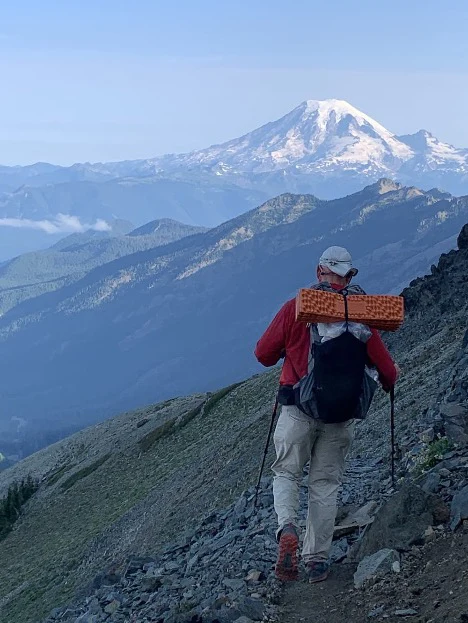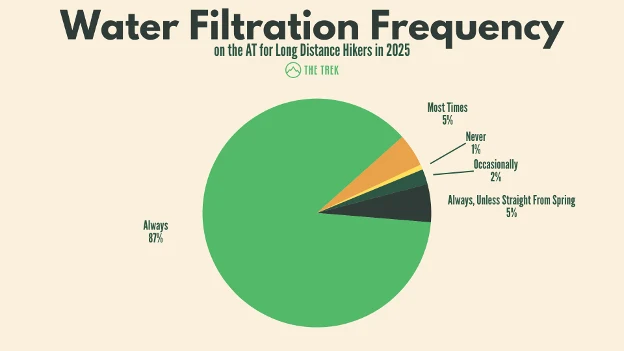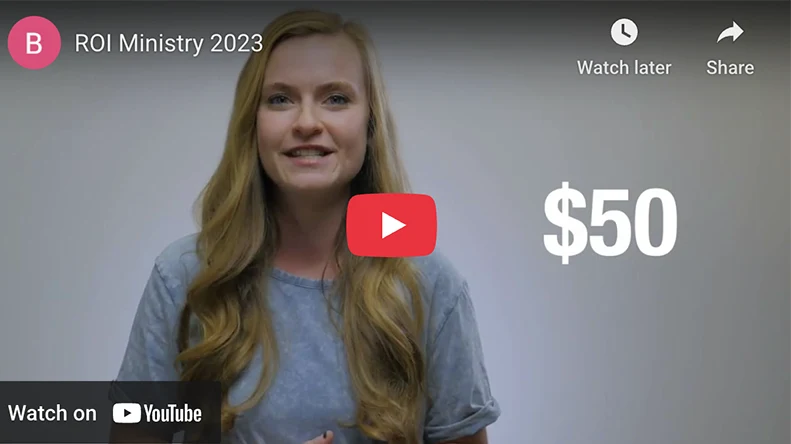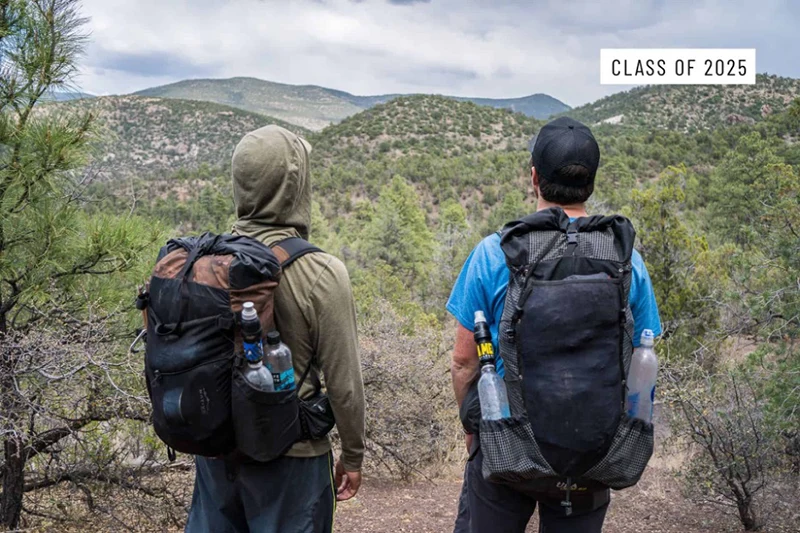One Step at a Time: Navigating Outdoor Anxieties
One Step at a Time: Navigating Outdoor Anxieties

One Step at a Time: Navigating Outdoor Anxieties
YouTube video highlight
From attending a mental health course to planning for anxiety on the trail, there are many ways to improve your confidence and knowledge outdoors.
Read more about the project
Disclaimer: This article is not a stand-in for therapy or mental health medications. Please seek assistance from a licensed mental health professional for mental health needs related or not related to the outdoors. If you’re experiencing a mental health crisis, text HOME to 741741 to connect with a volunteer Crisis Counselor.
Hi, I’m Hatie.
I’m a hiker and paddler who has been adventuring into the backcountry for 20 years & I regularly experience anxiety about and on trips.
Whether it's worrying I’ve packed the right gear for a multi-day canoe trip to thinking I’ll get lost on a day hike, there’s always something to occupy my mind.
But I don’t let anxiety keep me from getting outdoors. From taking an outdoor mental health course (see below - you gotta sign up!) to planning for anxiety on the trail, there are many ways to improve your confidence and knowledge around outside adventures big and small. Here are some tips from someone who’s been there:
Navigating Pre-adventure jitters
Nerves often build in the weeks and days leading up to an adventure. In my experience, the bigger the goals and the further away the destination, the higher the nerves. It’s normal (and healthy!) to be a bit on edge, but prolonged stress or cancelling a trip entirely might be a result of being unable to remain calm in the face of discomfort. Negate those nagging thoughts as much as possible by being prepared!
Not only will this level of preparedness help you feel more in control, it’s also fun! Prepping is a great way to use that antsy, excited energy about a trip when it’s not time to go yet.

Here are a few of my fears and how I manage them before leaving for an adventure:
I'm going to be in a rush before I leave: Begin packing well ahead of time. Take inventory of everything you have and order, purchase, or borrow things you need but don’t have.
I'm going to forget a piece of gear: Start a pile or fill a bag with items as you think of them.
Something might steal my food or scare me at night. Carry a bear canister.
I'll forget something day of: Create a packing list to check off right before you leave.
Something won't work right: Test gear, from checking stove fuel levels to patching damaged rainwear. Back flush water filters and clean stove fuel lines.
I'll get lost: Map out your route on paper and create a loose list of locations where you’ll spend the night to share with loved ones back at home.

Mindfulness Through Visualization
If pre-trip anxiety is starting to take your breath away, consider trying a mindfulness exercise. Sit in a comfortable position with minimal distraction. That may mean donning noise-canceling headphones or turning on some nature sounds and taking five minutes to yourself. Visualize your trip. Envision packing, leaving the house, and traveling to the destination. What do you smell in the car on the drive, what do you snack on during the plane ride?
Take note of sensory experiences to help you get in the moment.
Continue visualizing the entire trip or just parts you’re concerned about, like an intimidating whitewater set or a high-rated climbing wall. Visualize everything going perfectly. Then, another day, imagine things going wrong. What will you do if there’s a bear in the campsite, your group mate gets sick, or the car breaks down on the way to the trailhead?
Imagining how you’ll handle stressful situations can make it easier to work through the things you'll encounter along the way.
Plus, this simple process can ease your nerves and build confidence before leaving home.

Addressing On-Trail Concerns
Have a Group Info Kit: Print several copies of a document containing each person’s emergency contacts (2), medical issues, medications, and allergies. Keep copies in separate backpacks or vehicles so you can always access one. Consider stashing adventure-related permits and maps in these kits to keep it all together.
Managing Panic Attacks: Are you prone to panic attacks? Plan to have them outdoors to be prepared even if you don’t have one. Tell your group mates that you may experience a panic attack during your adventure. Explain what you want them to do if it happens. Let them know you’d like support like a tight hug, someone to hold your hand and breathe with you, or help to get a sour candy out of your bag to distract your senses and bring you back into a more grounded state.
More Mindfulness: Try a grounding exercise like connecting with your five senses. Identify five things you can see, four you can hear, three you can touch, two you can smell, and one you can taste. This logical exercise helps calm the nervous system and bring your focus back into the present.

Post-Adventure Expectations
If you’ve ever been on a longer adventure or one you’ve been looking forward to/planning for a long time, it can be difficult coming back to “real life.” Some people experience anxiety about reentering while on trail or feel overwhelming worry upon getting back to the trailhead, boat launch, or end of the journey.
Share expectations with loved ones, roommates, and friends on what you will likely want when you get back from a trip.
You might be down to talk all about your journey and share photos right away, or you might prefer a few hours or days to unwind. Consider planning a few days off at home as a buffer between the wilderness and returning to “real life.” This transition time can protect you from overwhelm and help you recover from exhaustion. Plus, you’ll have stuff to do, like unpacking, drying gear, and doing laundry.
With a little planning and some communication, anxiety doesn’t have to derail your outdoor adventures.
Try the tips above to increase confidence and preparedness before your next big or little trip!
Want to learn even more about mental health outdoors?
Take a Mental Health Wilderness First Aid class. The basic 16-hour course teaches participants about “recognizing, assessing, and supporting mental health” in the outdoors. You’ll learn about fight/flight/freeze/fawn responses and how to handle anxiety and stress on trail.
I’ve done the class and use the basic course info in my regular life - I recommend it to anyone, regardless of whether they adventure outdoors!
One Step at a Time: Navigating Outdoor Anxieties



Disclaimer: This article is not a stand-in for therapy or mental health medications. Please seek assistance from a licensed mental health professional for mental health needs related or not related to the outdoors. If you’re experiencing a mental health crisis, text HOME to 741741 to connect with a volunteer Crisis Counselor.
Hi, I’m Hatie.
I’m a hiker and paddler who has been adventuring into the backcountry for 20 years & I regularly experience anxiety about and on trips.
Whether it's worrying I’ve packed the right gear for a multi-day canoe trip to thinking I’ll get lost on a day hike, there’s always something to occupy my mind.
But I don’t let anxiety keep me from getting outdoors. From taking an outdoor mental health course (see below - you gotta sign up!) to planning for anxiety on the trail, there are many ways to improve your confidence and knowledge around outside adventures big and small. Here are some tips from someone who’s been there:
Navigating Pre-adventure jitters
Nerves often build in the weeks and days leading up to an adventure. In my experience, the bigger the goals and the further away the destination, the higher the nerves. It’s normal (and healthy!) to be a bit on edge, but prolonged stress or cancelling a trip entirely might be a result of being unable to remain calm in the face of discomfort. Negate those nagging thoughts as much as possible by being prepared!
Not only will this level of preparedness help you feel more in control, it’s also fun! Prepping is a great way to use that antsy, excited energy about a trip when it’s not time to go yet.

Here are a few of my fears and how I manage them before leaving for an adventure:
I'm going to be in a rush before I leave: Begin packing well ahead of time. Take inventory of everything you have and order, purchase, or borrow things you need but don’t have.
I'm going to forget a piece of gear: Start a pile or fill a bag with items as you think of them.
Something might steal my food or scare me at night. Carry a bear canister.
I'll forget something day of: Create a packing list to check off right before you leave.
Something won't work right: Test gear, from checking stove fuel levels to patching damaged rainwear. Back flush water filters and clean stove fuel lines.
I'll get lost: Map out your route on paper and create a loose list of locations where you’ll spend the night to share with loved ones back at home.

Mindfulness Through Visualization
If pre-trip anxiety is starting to take your breath away, consider trying a mindfulness exercise. Sit in a comfortable position with minimal distraction. That may mean donning noise-canceling headphones or turning on some nature sounds and taking five minutes to yourself. Visualize your trip. Envision packing, leaving the house, and traveling to the destination. What do you smell in the car on the drive, what do you snack on during the plane ride?
Take note of sensory experiences to help you get in the moment.
Continue visualizing the entire trip or just parts you’re concerned about, like an intimidating whitewater set or a high-rated climbing wall. Visualize everything going perfectly. Then, another day, imagine things going wrong. What will you do if there’s a bear in the campsite, your group mate gets sick, or the car breaks down on the way to the trailhead?
Imagining how you’ll handle stressful situations can make it easier to work through the things you'll encounter along the way.
Plus, this simple process can ease your nerves and build confidence before leaving home.

Addressing On-Trail Concerns
Have a Group Info Kit: Print several copies of a document containing each person’s emergency contacts (2), medical issues, medications, and allergies. Keep copies in separate backpacks or vehicles so you can always access one. Consider stashing adventure-related permits and maps in these kits to keep it all together.
Managing Panic Attacks: Are you prone to panic attacks? Plan to have them outdoors to be prepared even if you don’t have one. Tell your group mates that you may experience a panic attack during your adventure. Explain what you want them to do if it happens. Let them know you’d like support like a tight hug, someone to hold your hand and breathe with you, or help to get a sour candy out of your bag to distract your senses and bring you back into a more grounded state.
More Mindfulness: Try a grounding exercise like connecting with your five senses. Identify five things you can see, four you can hear, three you can touch, two you can smell, and one you can taste. This logical exercise helps calm the nervous system and bring your focus back into the present.

Post-Adventure Expectations
If you’ve ever been on a longer adventure or one you’ve been looking forward to/planning for a long time, it can be difficult coming back to “real life.” Some people experience anxiety about reentering while on trail or feel overwhelming worry upon getting back to the trailhead, boat launch, or end of the journey.
Share expectations with loved ones, roommates, and friends on what you will likely want when you get back from a trip.
You might be down to talk all about your journey and share photos right away, or you might prefer a few hours or days to unwind. Consider planning a few days off at home as a buffer between the wilderness and returning to “real life.” This transition time can protect you from overwhelm and help you recover from exhaustion. Plus, you’ll have stuff to do, like unpacking, drying gear, and doing laundry.
With a little planning and some communication, anxiety doesn’t have to derail your outdoor adventures.
Try the tips above to increase confidence and preparedness before your next big or little trip!
Want to learn even more about mental health outdoors?
Take a Mental Health Wilderness First Aid class. The basic 16-hour course teaches participants about “recognizing, assessing, and supporting mental health” in the outdoors. You’ll learn about fight/flight/freeze/fawn responses and how to handle anxiety and stress on trail.
I’ve done the class and use the basic course info in my regular life - I recommend it to anyone, regardless of whether they adventure outdoors!
One Step at a Time: Navigating Outdoor Anxieties



Disclaimer: This article is not a stand-in for therapy or mental health medications. Please seek assistance from a licensed mental health professional for mental health needs related or not related to the outdoors. If you’re experiencing a mental health crisis, text HOME to 741741 to connect with a volunteer Crisis Counselor.
Hi, I’m Hatie.
I’m a hiker and paddler who has been adventuring into the backcountry for 20 years & I regularly experience anxiety about and on trips.
Whether it's worrying I’ve packed the right gear for a multi-day canoe trip to thinking I’ll get lost on a day hike, there’s always something to occupy my mind.
But I don’t let anxiety keep me from getting outdoors. From taking an outdoor mental health course (see below - you gotta sign up!) to planning for anxiety on the trail, there are many ways to improve your confidence and knowledge around outside adventures big and small. Here are some tips from someone who’s been there:
Navigating Pre-adventure jitters
Nerves often build in the weeks and days leading up to an adventure. In my experience, the bigger the goals and the further away the destination, the higher the nerves. It’s normal (and healthy!) to be a bit on edge, but prolonged stress or cancelling a trip entirely might be a result of being unable to remain calm in the face of discomfort. Negate those nagging thoughts as much as possible by being prepared!
Not only will this level of preparedness help you feel more in control, it’s also fun! Prepping is a great way to use that antsy, excited energy about a trip when it’s not time to go yet.

Here are a few of my fears and how I manage them before leaving for an adventure:
I'm going to be in a rush before I leave: Begin packing well ahead of time. Take inventory of everything you have and order, purchase, or borrow things you need but don’t have.
I'm going to forget a piece of gear: Start a pile or fill a bag with items as you think of them.
Something might steal my food or scare me at night. Carry a bear canister.
I'll forget something day of: Create a packing list to check off right before you leave.
Something won't work right: Test gear, from checking stove fuel levels to patching damaged rainwear. Back flush water filters and clean stove fuel lines.
I'll get lost: Map out your route on paper and create a loose list of locations where you’ll spend the night to share with loved ones back at home.

Mindfulness Through Visualization
If pre-trip anxiety is starting to take your breath away, consider trying a mindfulness exercise. Sit in a comfortable position with minimal distraction. That may mean donning noise-canceling headphones or turning on some nature sounds and taking five minutes to yourself. Visualize your trip. Envision packing, leaving the house, and traveling to the destination. What do you smell in the car on the drive, what do you snack on during the plane ride?
Take note of sensory experiences to help you get in the moment.
Continue visualizing the entire trip or just parts you’re concerned about, like an intimidating whitewater set or a high-rated climbing wall. Visualize everything going perfectly. Then, another day, imagine things going wrong. What will you do if there’s a bear in the campsite, your group mate gets sick, or the car breaks down on the way to the trailhead?
Imagining how you’ll handle stressful situations can make it easier to work through the things you'll encounter along the way.
Plus, this simple process can ease your nerves and build confidence before leaving home.

Addressing On-Trail Concerns
Have a Group Info Kit: Print several copies of a document containing each person’s emergency contacts (2), medical issues, medications, and allergies. Keep copies in separate backpacks or vehicles so you can always access one. Consider stashing adventure-related permits and maps in these kits to keep it all together.
Managing Panic Attacks: Are you prone to panic attacks? Plan to have them outdoors to be prepared even if you don’t have one. Tell your group mates that you may experience a panic attack during your adventure. Explain what you want them to do if it happens. Let them know you’d like support like a tight hug, someone to hold your hand and breathe with you, or help to get a sour candy out of your bag to distract your senses and bring you back into a more grounded state.
More Mindfulness: Try a grounding exercise like connecting with your five senses. Identify five things you can see, four you can hear, three you can touch, two you can smell, and one you can taste. This logical exercise helps calm the nervous system and bring your focus back into the present.

Post-Adventure Expectations
If you’ve ever been on a longer adventure or one you’ve been looking forward to/planning for a long time, it can be difficult coming back to “real life.” Some people experience anxiety about reentering while on trail or feel overwhelming worry upon getting back to the trailhead, boat launch, or end of the journey.
Share expectations with loved ones, roommates, and friends on what you will likely want when you get back from a trip.
You might be down to talk all about your journey and share photos right away, or you might prefer a few hours or days to unwind. Consider planning a few days off at home as a buffer between the wilderness and returning to “real life.” This transition time can protect you from overwhelm and help you recover from exhaustion. Plus, you’ll have stuff to do, like unpacking, drying gear, and doing laundry.
With a little planning and some communication, anxiety doesn’t have to derail your outdoor adventures.
Try the tips above to increase confidence and preparedness before your next big or little trip!
Want to learn even more about mental health outdoors?
Take a Mental Health Wilderness First Aid class. The basic 16-hour course teaches participants about “recognizing, assessing, and supporting mental health” in the outdoors. You’ll learn about fight/flight/freeze/fawn responses and how to handle anxiety and stress on trail.
I’ve done the class and use the basic course info in my regular life - I recommend it to anyone, regardless of whether they adventure outdoors!


























































































































